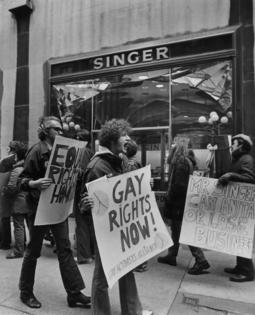Commentary: What a forgotten civil rights advocate can teach us about studying LGBTQ+ history
Published in Op Eds
Bruce Scott’s only obituary was published in the Tribune on Dec. 30, 2001. A meager recounting of his family, friends and neighborhood, the final sentence bluntly tells readers, “No services will be held.”
It’s a sparse account for the plaintiff in one of the first successful cases in U.S. history defending gay Americans from discrimination. Four years before the Stonewall uprising, Scott’s case created critical protections for gay federal employees and helped end the Lavender Scare, the Cold War campaign to remove gay workers from the federal government. Despite his contributions to gay history, searching for Scott’s name online returns but a scant trace. So where did Scott go?
Bruce Chardon Scott was born in 1912 and raised on Chicago’s South Side. After graduating from college and serving in the Army, he built a career with the Department of Labor in Washington, D.C. For years, he navigated a quiet dual life: a dedicated civil servant and a gay man whose community was Washington’s queer nightlife.
In February 1956, Scott’s careful balance was upturned when his boss came to him with a warning to resign. A security clearance check had found a 1947 arrest for loitering in D.C.’s Lafayette Square, then a known cruising ground for gay men and, as Scott had learned, a site for police entrapment schemes. Though he had not propositioned the undercover officer, he was nonetheless booked. Nine years later, it outed him. Scott became one of thousands of victims of the Lavender Scare.
Barred from working for the government or federal contractors, Scott was ineligible for almost any local work. He was plunged into poverty, with years of underpaying jobs, each of which fired him when his arrest came to light. Sometimes, Scott lived on just 50 cents a day. The Virginia home he was building became a leaky, half-finished monument to a life he was no longer allowed to live. But Scott resolved to fight — by suing the U.S. government.
In 1961, he wrote to Frank Kameny, a government astronomer who had unsuccessfully fought his termination to the U.S. Supreme Court. Soon, Scott became a founding member of Kameny’s Mattachine Society of Washington, a historic organization that popularized gay pride. Scott, under a pseudonym, helped frame its constitution.
Scott began to lay the groundwork for his lawsuit. He reapplied to the Department of Labor and made connections at the nascent American Civil Liberties Union of D.C. As expected, the government rejected him over being gay. In 1962, Scott filed suit with ACLU representation against John Macy, chairman of the U.S. Civil Service Commission, which was implementing the Lavender Scare.
The filing of Scott v. Macy brought Scott immediate publicity. In an interview with the Washington Evening Star, Scott said he “realized that his suit would place him in the spotlight” and proclaimed that he hoped to win and become a symbol for gay advancement in America. The case moved slowly, and in the first ruling, a U.S. District Court judge ruled against Scott. He immediately appealed.
In late 1963, Scott left D.C. for Chicago. Hundreds of miles removed from the site of his arrest, Scott was finally able to find employment — though even here, being outed to his workplace would mean termination. The preceding years had cost Scott heavily. Before finding work in Chicago, he lost his house and car to debt collection. So, when Scott discovered that his story was to be featured in Life magazine, he knew the national publicity would mean unemployment and yet worse poverty. Where he once welcomed the spotlight, now he wrote to Life to ask for his name to be removed from his story. In June 1964, the story was published. Scott’s name was nowhere to be found.
The following year, a U.S. Appeals Court delivered a stunning verdict: 2-to-1 for Scott. It found the government could not disqualify an applicant based on a vague charge of homosexual “immoral conduct,” without specifying the conduct. For the first time, a court had ruled against the federal government’s ability to discriminate against gay workers.
Congratulations from gay circles poured in from across the country. Thousands of gay federal employees suddenly had a beachhead against discrimination, but Scott’s win could not get him his own job back. Rather than appeal to the Supreme Court and risk a ruling there, the government allowed Scott the legal win, while having the Civil Service Commission immediately reopen a new denial of his employment. Scott was devastated, writing that he was right back to where he started. The ACLU filed a further suit on Scott’s behalf, winning on a technicality in 1968, but Scott was tired, wryly noting that the commission was “free to try a third time to bar me.” They never did, and in an odd sort of truce, Scott never reapplied to the federal government either.
Scott’s case would eventually help end the Lavender Scare. Other cases built on his victory, including Norton v. Macy in 1969, which alongside Scott established a two-case “homosexual bill of rights.” But Scott continued to protect his professional life. He performed quiet activism in private gay societies but never again sought the spotlight.
Scott’s story is a case study in how LGBTQ+ minorities can be lost to history. Scott’s obscurity was the price he paid to survive. In an era when queer history is once again a political battleground, remembering Scott is not just an act of history, but also a reminder of the cost of fighting for a better world.
____
Madelyn Harrington is a historical researcher, filmmaker and software developer based in Virginia. She graduated from Kenyon College in 2022. In addition to researching queer history at George Mason University, she works to expand coverage of women’s and queer history on Wikipedia.
_____
©2025 Chicago Tribune. Visit at chicagotribune.com. Distributed by Tribune Content Agency, LLC.

























































Comments